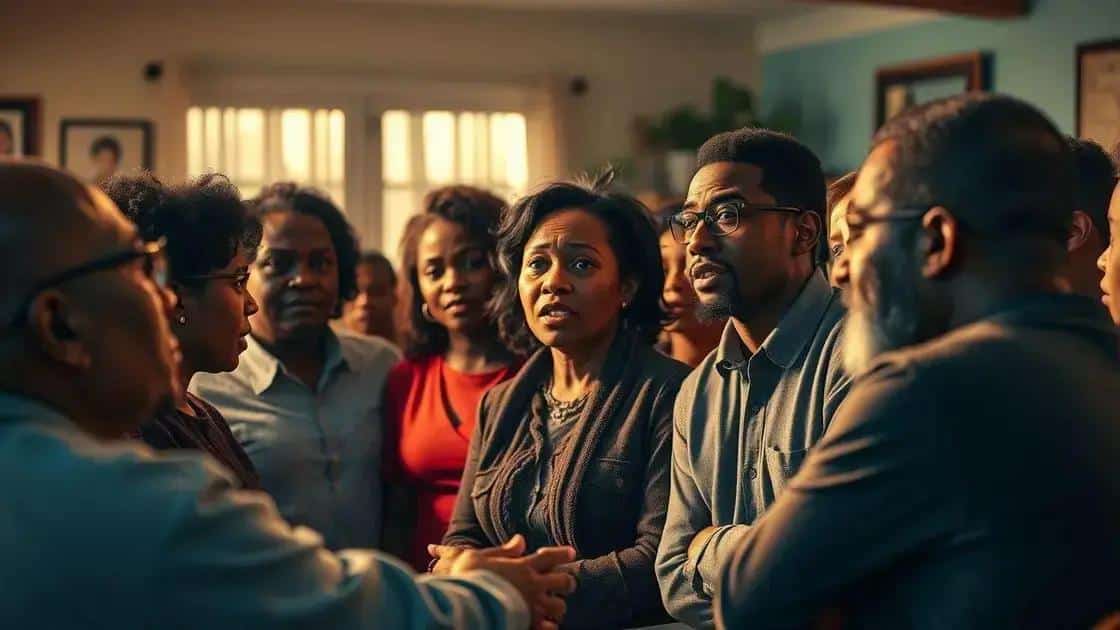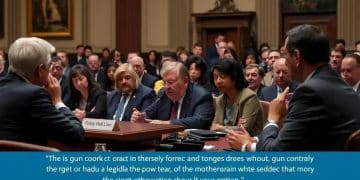Leave gun control debate: exploring diverse perspectives

Gun control debates focus on the balance between individual rights to own firearms and the need for public safety, with varying views on how laws impact crime rates and community well-being.
Leave gun control debate aside for a moment, and let’s dive into the intricacies surrounding this contentious issue. What if understanding all angles could lead to more productive conversations?
Key arguments in the gun control debate
The issue of gun control is multifaceted and stirs strong emotions. Many people hold deeply rooted beliefs on this subject. It’s essential to explore the key arguments in the gun control debate to understand different viewpoints.
Proponents of Gun Control
Those in favor of stricter gun control laws often highlight several important arguments:
- Increased safety for communities
- Reduction in gun-related violence
- Prevention of access to firearms for dangerous individuals
Advocates believe that sensible regulations can save lives. They focus on the statistics that show a correlation between gun ownership rates and rates of firearm deaths.
Opponents of Gun Control
On the other side of the debate, opponents of gun control present their own strong arguments:
- Protection of individual rights
- The right to bear arms as a constitutional guarantee
- Self-defense and personal safety considerations
These individuals assert that responsible gun ownership can lead to safer communities. They argue that strict regulations may impede law-abiding citizens while doing little to deter criminals.
Other important elements in this debate include the impact of cultural attitudes toward guns. Many view firearms as symbols of personal freedom. This cultural significance can shape people’s opinions on gun control laws.
Ultimately, both sides present compelling points that deserve consideration. Understanding these key arguments helps illuminate the complexities surrounding the gun control issue, fostering a more informed discussion.
Historical context of gun control in the US

The historical context of gun control in the US is rich and complex. Understanding this background helps clarify the current debates over gun laws. The conversation around firearms has evolved significantly over the centuries.
Early History
In the early days of America, gun ownership was common. Firearms were necessary for hunting and defense. The Second Amendment was ratified in 1791, granting citizens the right to bear arms. This was influenced by the desire for self-defense and resistance against tyranny.
20th Century Developments
As the 20th century progressed, rising crime rates and high-profile incidents led to increased calls for gun control. The 1934 National Firearms Act introduced regulations on machine guns and sawed-off shotguns. This marked the beginning of federal regulation.
- 1968 Gun Control Act: Aimed to limit sales to convicted felons and mentally ill individuals.
- 1986 Firearm Owners Protection Act: Addressed some concerns over government overreach in gun sales.
- 1993 Brady Handgun Violence Prevention Act: Established background checks for handgun purchasers.
These measures reflected growing public concern about gun violence. Despite opposition, many Americans supported the idea of regulations to help ensure safety.
In recent years, events such as mass shootings have reignited debates about gun control. Movements advocating for more stringent laws have gained momentum alongside arguments defending the right to bear arms. Events and tragedies have shaped public opinion and policy dramatically.
Through all these changes, the underlying tension between the right to own firearms and the need for safety continues to influence discussions on gun control in the US. Understanding this context is crucial for engaging with current debates.
Impact of gun laws on crime rates
The impact of gun laws on crime rates is a subject of significant debate. Many studies analyze the relationship between stricter regulations and the incidence of crime. Understanding this connection is vital for policymakers and the public.
Relationship Between Gun Laws and Violence
Research shows that regions with stricter gun laws often experience lower rates of gun violence. Some key findings indicate:
- Increased background checks may decrease gun trafficking.
- Limitations on certain types of firearms can lead to lower homicide rates.
- Countries with strict gun control laws, like Japan and the UK, report fewer gun-related deaths.
These statistics suggest a connection between regulation and public safety. However, the discussions are nuanced, as various factors impact crime rates.
Opposing Perspectives
On the other hand, opponents of strict gun laws argue that crime can still occur regardless of regulations. They point out that criminals do not typically follow the law. Furthermore, areas with high crime rates often have existing laws that are not adequately enforced.
Some studies have shown that in places with high gun ownership, like rural areas, self-defense situations can deter crime. This suggests the need for a balanced approach to legislation.
Another important aspect is the cultural context. In regions where firearms are more a part of tradition, such as in rural America, tighter restrictions may not translate into lower crime. For these communities, gun ownership is often linked with safety and personal rights.
Overall, the impact of gun laws on crime rates remains a complex and evolving topic. Continuing research and discussion are crucial to inform effective policies that uphold public safety and respect individual rights.
Social implications of the gun control debate

The social implications of the gun control debate are significant and far-reaching. Understanding these implications helps to clarify why this topic resonates deeply with many people. The conversation around gun control goes beyond just laws; it impacts communities, safety, and individual rights.
Community Safety and Gun Control
A key aspect of the gun control discussion is community safety. Many believe that stricter laws can help reduce crime and violence. Research has shown that communities with more stringent regulations often report lower gun-related incidents.
- Stricter background checks can prevent dangerous individuals from obtaining firearms.
- Gun buyback programs can reduce the number of weapons on the streets.
- Education and training can promote responsible gun ownership.
This focus on safety reflects a widespread concern for the well-being of families and neighborhoods.
Cultural and Emotional Factors
On the flip side, there are cultural and emotional aspects tied to gun ownership. For many, the right to own a firearm is linked to personal freedom and self-defense. This feeling can be especially strong in rural areas where gun ownership is often a part of the lifestyle.
Moreover, the gun control debate can evoke strong emotions, leading to divisions within communities. People on opposing sides may have fundamentally different values. This sometimes results in heated discussions that can polarize friends and families.
Media coverage also plays a role in shaping perceptions. Reports of mass shootings can amplify fears about safety, prompting calls for stricter laws. However, they can also lead to backlash from those who feel their rights are being threatened.
Social movements have emerged in response to the debate, advocating for both gun rights and gun control. These movements reflect broader societal attitudes and mobilize people to take action, whether through protests, lobbying, or community education.
In sum, the social implications surrounding the gun control debate highlight the complexities of public safety, cultural identity, and emotional responses. The conversation is ongoing, and how society chooses to navigate these issues will have lasting effects.
The gun control debate showcases the complexities of society and our evolving views on safety and rights. As we navigate this contentious topic, it’s important to remember that understanding both sides can lead to better solutions. Open conversations, research, and empathy are vital as communities work to find a balanced approach to gun ownership and public safety.
FAQ – Frequently Asked Questions about Gun Control Debate
What are the main arguments for stricter gun control?
Proponents argue that stricter laws can lead to reduced gun violence, prevent dangerous individuals from accessing firearms, and increase community safety.
How do gun laws affect crime rates?
Research shows that areas with stricter gun laws often experience lower rates of gun-related crimes, although many believe that enforcement is key.
What cultural factors influence opinions on gun control?
Cultural identity and traditions around firearms play a significant role, especially in rural areas where gun ownership is often seen as a personal right.
How can communities engage in the gun control debate?
Communities can promote dialogue and education to foster understanding between different perspectives on gun control and work toward balanced solutions.






